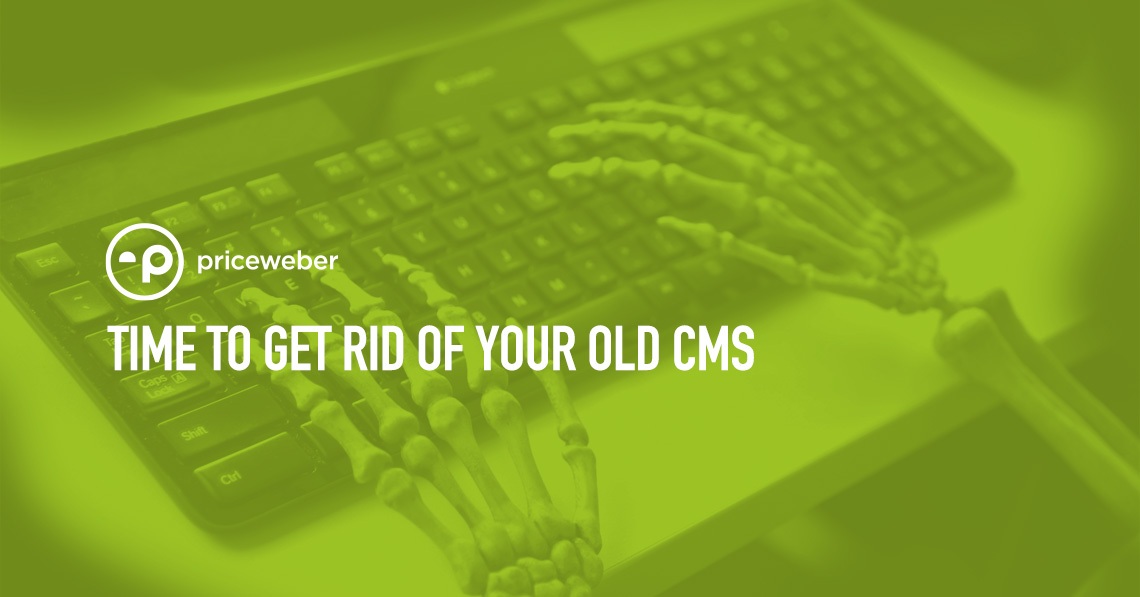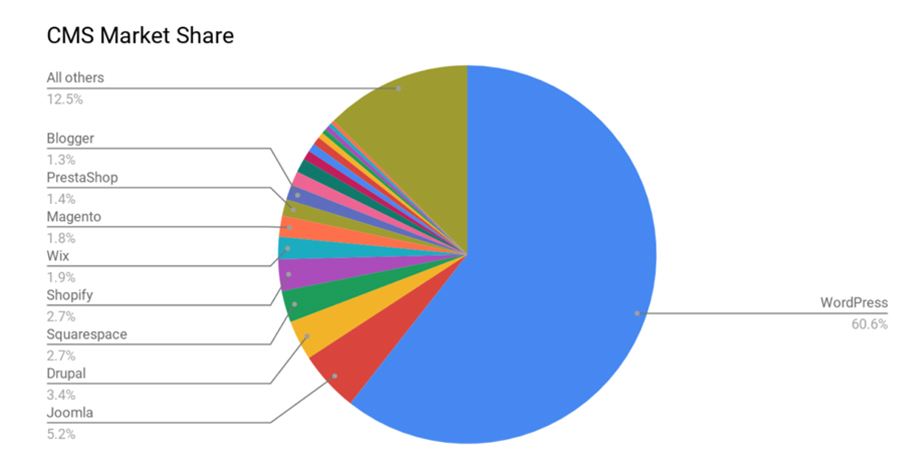For years you’ve had your website on a partner’s proprietary content management system. Why is now the time for a change? In this installment of our plain-talk digital series, we’ll explain.
What Is A Content Management System?
A content management system – abbreviated as CMS – in the simplest terms is the software that you or your web developer uses to publish your website on the internet. It allows you to control content, the way your site looks, what fonts you use and how images and video display. It also allows you to make edits to copy, etc. Almost every website is built in a CMS of some type, including yours.
In the 1990’s, website content was super clunky. It started out as just text. Then someone invented “style sheets” that allowed you to make your sites look more organized. Then eventually you could add things like images, sound and ultimately modern functions like forms, animation and video. For a history of the evolution of the CMS, check out this great article.
As web developers got more experience, many began to look for shortcuts to make building and managing sites easier. This was the birth of the CMS. Many new web agencies marketed their proprietary CMS as the solution to more bulletproof websites. They were right at that time. And it was great business too. By getting a client to use their proprietary CMS, agencies had an ideal razors-and-razor-blades situation. First they’d sell you the site in their CMS. Then you would depend on the agency for updates, maintenance, upgrades and custom add-ons that only that agency could provide.
Today’s CMS
As demand grew for better, simpler and more functional content systems, a new breed of off-the-shelf CMS emerged. Systems like WordPress, Kentico, Craft CMS, Joomla and Drupal were created. These were systems that were easy to use and easy to manage. Some systems, like Magento, were created to target e-commerce customers. Other systems were built for content rich brand sites and blogs.
Today there is no one-size-fits-all CMS. However the scale at which these systems are created, deployed and updated can’t be replicated by agencies who stand by their old proprietary systems. For this reason, today the vast majority of businesses have migrated away from their old proprietary CMS to these more functional and reliable content systems.
Reasons To Switch To A Non-Proprietary CMS Now
Site Cost
Because they are relatively easy to build, sites in a CMS like WordPress are generally quicker and cheaper to build. We recently built and launched 20 facility websites for a client in 16 weeks for less than they were paying annually for maintenance on their previous proprietary CMS sites.
Maintenance Cost
Speaking of maintenance costs, we find that one of our client’s biggest complaints about their old CMS is the annual maintenance costs. Most off-the-shelf CMS systems feature automatic updates that are included in the low cost of the system. We find these sites to be nearly maintenance-free.
Usability
On many proprietary CMS’s, the user interface (the place where you enter content, photos and videos) isn’t very easy for clients to use. Worse, some systems require a developer to enter content at additional cost to the client. With most off-the-shelf CMS’s, the client can easily manage their own content entry in-house (if they like). We even provide clients with CMS training prior to launch so they have the choice.
SEO
We’ll get into SEO in a future plain-talk e-mail, but suffice it to say, SEO is what makes your website easy to find when someone Googles. Large content systems like WordPress do an excellent job organizing your content code to be “indexed” by Google and other search engines for search. Poor SEO can also clobber your bottom line. If someone searches for your product and a competitor comes up first in their search, you just lost a customer.
Freedom
Another common complaint we’ve heard from clients who migrated from a proprietary system was that they felt “trapped” by their previous agency because that agency was the only one who could make changes or updates to the client’s website. That’s deliberate. (Remember razors and razor blades?) With larger content systems, the agency has to continually work to earn your business because if they don’t, the client can move to an agency who will without the fear of being locked into an exclusive CMS.
Top Arguments You Will Hear From Your Proprietary CMS Agency
Full disclosure. Like many digital agencies, ours developed a proprietary CMS in the late 1990’s and sold it to clients. But several years ago, we decided to retire it because off-the-shelf content systems that were available had become so good; we could no longer sell ours to clients in good conscience.
Today, when we talk to potential clients currently on proprietary systems, here are some of the arguments (and even scare tactics) that are used to talk them out of switching:
Myth 1: “WordPress (or Joomla, etc.) is just blogging CMS and can’t support a real website.”
Total nonsense. For example, WordPress is actually now the CMS for many businesses, serving 30% of the web including Fortune 500 companies and millions of other sites. Also use of WordPress by the top 100 fastest-growing companies in the U.S. jumped to 62% from 42% just last year.
Myth 2: “Off-the-shelf CMS’s don’t support multi-site functionality.”
Also not true. If you have a company that requires multiple sites (e.g. a healthcare business with clinics in different cities or a manufacturer who sells in different countries), then you probably need multi-site functionality. A number of off-the-shelf systems do an excellent job with multi-site. Again, using WordPress with their WPEngine hosting solution as an example, multi-site is a breeze and a big money saver for our clients.
Myth 3: “Those CMS’s can’t do X.”
Often proprietary CMS agencies have built functions for client sites that they believe cannot be duplicated on off-the-shelf systems. In most cases, this is just false. The open source nature of some of these systems means that someone, somewhere probably already built a widget, plug-in or API (program interface) that’s as good or better than what you have.
Myth 4: “If you switch to a new CMS, it will mess up your SEO.”
Nope. No it won’t. The act of simply switching from a proprietary CMS to a more modern CMS will not mess up your organic search results. In fact, most large content systems actually improve your SEO results instantly by helping index your content better for the search engines. For example, on the above-mentioned 20 site migration, we saw SEO improve within two weeks of launching the sites.
So What Now?
If, for the reasons above, you think you may be ready to make the switch from a proprietary CMS, you still need to choose the right one for your business. A good agency will do a business analysis with you and recommend the best solution based on your requirements, the functionality and reliability of different systems, security concerns and a host of other factors.
More Information On Choosing The Right CMS For Your Business
If you’d like some help with choosing a new CMS and migrating your site to a more efficient, effective and financially attractive option, just contact the PriceWeber team online or call us at 502-499-9220, and we’d be happy to introduce you to one of our digital experts who can share some options with you.




